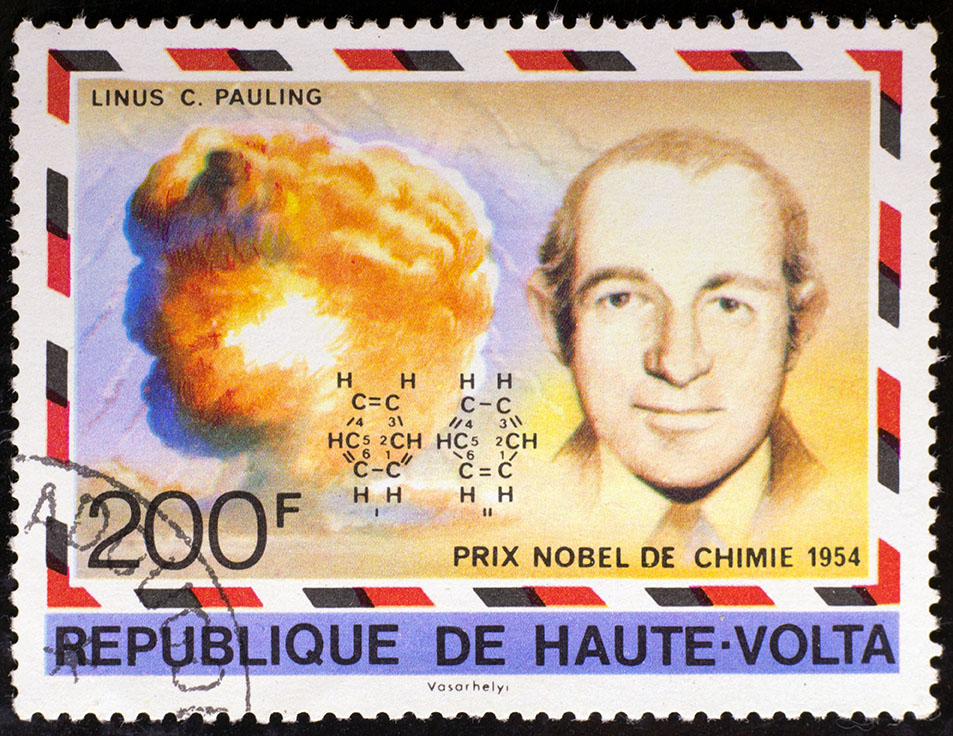

Linus Pauling was an American chemist, biochemist, peace activist, author, and educator. He was one of the most influential scientists of the 20th century and one of the founders of quantum chemistry. He was awarded the 1954 Nobel Prize in Chemistry for his research on the nature of the chemical bond and its application to the elucidation of the structure of complex molecules. He was later awarded the 1962 Nobel Peace Prize for his campaign against nuclear weapons.
Pauling was born in Portland, Oregon, in 1901. He graduated from Oregon State University and then studied at the California Institute of Technology, where he received his PhD in chemistry in 1925. After graduating, Pauling did postdoctoral research at the University of Cambridge in England and at the Institute for Theoretical Physics in Leipzig, Germany.
In 1929, Pauling returned to the United States and joined the faculty of the California Institute of Technology. He remained at Caltech for the rest of his career, and he was instrumental in building the school into one of the leading research universities in the world.
Pauling's research in quantum chemistry revolutionized the understanding of the chemical bond. He developed the valence bond theory and the molecular orbital theory, which are still used today to explain the structure and properties of molecules. Pauling also made significant contributions to the understanding of proteins and nucleic acids, the molecules that make up living cells.
In addition to his scientific work, Pauling was also a vocal advocate for peace and social justice. He was a strong opponent of nuclear weapons and worked to promote nuclear disarmament. He also spoke out against racism and discrimination. Pauling was a tireless advocate for the power of science to improve the world.
Pauling died in 1994 at the age of 93. He was one of the most influential scientists of the 20th century, and his work continues to have a profound impact on our understanding of the world around us.
The Linus Pauling Institute is a research institute dedicated to the study of molecular biology.

The name "Linus Pauling" does not have any different forms. It is a proper noun, which means that it refers to a specific person or place. It is not possible to change the form of a proper noun without changing its meaning.
The name "Linus Pauling" is a compound name, made up of two words:
Linus: A Latin name that means "flax" or "flax colored".
Pauling: A German name that means "son of Paul".
What is Linus Pauling famous for?
Question:
Discuss the contributions of Linus Pauling to the field of science, particularly focusing on his work in chemistry and his revolutionary insights into the nature of chemical bonding.
Answer:
Linus Pauling, a renowned American chemist, made significant contributions to the field of science, particularly in the realm of chemistry. One of his most revolutionary insights was his elucidation of the nature of chemical bonding, which earned him the Nobel Prize in Chemistry in 1954.
Pauling's groundbreaking work centred on the concept of electronegativity – the tendency of an atom to attract electrons. He proposed the concept of "hybridization," which explained how atomic orbitals combine to form hybrid orbitals that are essential for bonding in molecules. This laid the foundation for understanding the diversity of chemical compounds and their properties.
Moreover, Pauling introduced the idea of "resonance" to explain molecules with multiple bonding arrangements that couldn't be represented by a single Lewis structure. This concept became pivotal in understanding the stability and behaviour of complex molecules.
Beyond his work in chemical bonding, Pauling was an advocate for the potential health benefits of vitamin C, and his book "Vitamin C and the Common Cold" became popular. However, this aspect of his career also sparked debates within the scientific community.
In summary, Linus Pauling's contributions to chemistry, especially his insights into chemical bonding and molecular structure, significantly advanced the understanding of the fundamental principles of matter. His work remains foundational to modern chemistry and continues to inspire scientists worldwide.
Address
Developing Experts Limited
Exchange Street Buildings
35-37 Exchange Street
Norwich
NR2 1DP
UK
Phone
01603 273515
Email
hello@developingexperts.com
Copyright 2025 Developing Experts, All rights reserved.